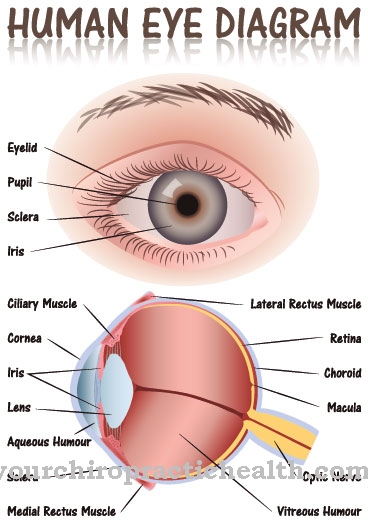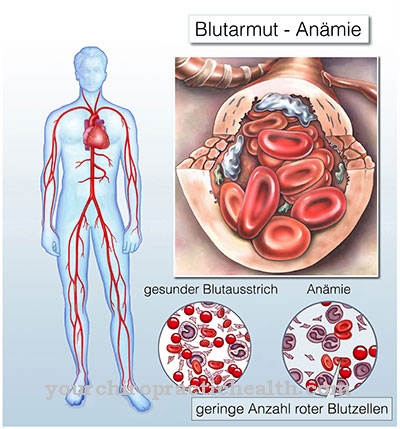The Burkitt lymphoma as a form of cancer is a relatively rapidly growing lymph node enlargement. Early treatment of the disease can help to completely cure Burkitt's lymphoma.
What is Burkitt Lymphoma?

Burkitt's lymphoma is a cancer that, according to its discoverer, Dr. Denis Burkitt (English tropical doctor) is named. Burkitt lymphoma is a malignant lymphoma, i.e. a malignant enlargement of the lymph nodes.
Colloquially, Burkitt's lymphoma is often equated with the terms lymph gland cancer; medically, however, this parallel is not entirely correct. In medicine, a distinction is made between three different forms that Burkitt's lymphoma can take: A first form is the so-called endemic Burkitt's lymphoma, which occurs more frequently in areas of East and Central Africa.
Children between the ages of six and seven are primarily affected by the form of the disease. The so-called sporadic Burkitt's lymphoma occurs worldwide, but is relatively rare. Finally, HIV-associated Burkitt's lymphoma is often found in people who are infected with the HI virus.
causes
The causes that can lead to Burkitt's lymphoma have not yet been conclusively elucidated. In addition, the causative factors differ depending on the type of Burkitt's lymphoma. Among other things, the influence of genetic factors on a developed Burkitt lymphoma is possible:
For example, different chromosome sections (the carriers of the genetic material) can be damaged, which can have a negative impact on the control of cell division processes. It is also suspected that the immune system has a causal influence on Burkitt's lymphoma: Burkitt's lymphoma can possibly be favored by defects or weakened immune systems.
Finally, the causal influence of the so-called Epstein-Barr virus (a virus from the herpes virus family) on Burkitt's lymphoma is also being discussed. The virus is often found in people with endemic Burkitt's lymphoma and can be transmitted through saliva, for example.
You can find your medication here
➔ Medicines to strengthen the defense and immune systemSymptoms, ailments & signs
If Burkitt's lymphoma is not treated, it usually leads to death, as it metastasizes the body. As a rule, the syndrome itself leads primarily to very severe swelling on the face. These swellings are often associated with pain and lead to a significantly reduced quality of life for the patient.
Abdominal pain and nausea, which often occurs with vomiting, also occur. Burkitt's lymphoma can also lead to disorders of sensitivity or paralysis, which can usually occur over the entire body. This leads to significant restrictions on movement and therefore to restrictions in everyday life.
Most patients feel tired and exhausted and no longer take an active part in everyday life. Disturbances in consciousness or even a loss of consciousness can occur and lead to a coma. Often those affected are dependent on outside help in their everyday life due to the symptoms. Psychological complaints or depression can also occur. Due to the severe pain, it is no longer possible for the person concerned to be physically active or to take part in sporting activities.
Diagnosis & course
Burkitt's lymphoma can be diagnosed with the help of various methods: First, the treating physician can, for example, scan the lymph nodes.
As a rule, the doctor also asks the person concerned about their previous medical history. To confirm a diagnosis of Burkitt's lymphoma, samples of cells and existing tumor tissue are often taken from the patient. How far Burkitt's lymphoma has developed can be determined, among other things, by examining blood, bone marrow or the cerebrospinal fluid.
Since Burkitt's lymphoma is a relatively fast-growing lymphoma, early diagnosis and treatment are crucial for the course of the disease. If Burkitt's lymphoma is not treated, it can lead to death within just a few months. If Burkitt's lymphoma is treated early, its course is positive in the majority of cases; however, relapses can often occur.
Complications
Burkitt's lymphoma can lead to various complications. These depend mainly on the spread of the tumor, which is why a general prediction is usually not possible. In most cases, the patient has severe swelling of the face and nausea. Abdominal pain and vomiting also occur.
The quality of life and everyday life are severely restricted by Burkitt's lymphoma. There are also disorders of consciousness and paralysis. Many patients also develop mental illness and depression as a result of Burkitt's lymphoma. Many affected people feel generally weak.
It is no longer possible to perform certain physical activities or sports. Complete cure cannot be achieved in every case. However, it is advisable to start treatment early. In most cases, chemotherapy is used.
Even with complete healing, this can occur again and stress the patient. In serious cases, Burkitt's lymphoma affects not only the organs, but also entire structures of the body, which also has a negative impact on health.
When should you go to the doctor?
If unusual swelling is noticed on the face, a doctor should be consulted. Other symptoms that must be clarified: frequent gastrointestinal complaints, paralysis and nerve pain. Even those who repeatedly notice bruises that persist longer than usual should see a doctor if they suspect Burkitt's lymphoma.
Since this special form of cancer progresses relatively quickly, early treatment is essential for its further course. Burkitt's lymphoma probably occurs in connection with the Epstein-Barr virus (causative agent of Pfeiffer's glandular fever).
Immunodeficiencies, such as those found in people with HIV and in patients who regularly take immunosuppressants, also appear to favor cancer. Those who belong to these risk groups should take the typical warning signs particularly seriously. A precautionary clarification with your family doctor is always useful. In the event of a specific suspicion, a specialist in lymphology or a lymph therapist should be consulted directly. After the treatment is completed, various follow-up examinations are necessary. If a recurrence is suspected, the responsible doctor must be informed immediately.
Doctors & therapists in your area
Treatment & Therapy
The form in which Burkitt's lymphoma is treated depends initially on the stage of development that the lymphoma has already reached. The earlier Burkitt's lymphoma can be treated, the higher the chances of a complete cure.
Burkitt's lymphoma often affects not just individual organs, but various body structures. If this is the case, chemotherapy can be a sensible measure. The aim of this form of therapy is to prevent Burkitt's lymphoma from spreading to other areas of the body. Since Burkitt's lymphoma is sensitive to radiation, radiation therapy can also be used in parallel. However, radiation therapy is usually only used if the Burkitt's lymphoma is still relatively limited locally.
Further treatment options include so-called antibody therapy, in which antibodies can kill tumor cells. Bone marrow or stem cell transplants may be necessary if previous therapy methods have not shown the desired success.
Outlook & forecast
Burkitt's lymphoma can be completely cured in many cases. However, the prerequisite for a complete cure is the early diagnosis and therapy of the syndrome in order to prevent the tumor from spreading.
If the tumor is not discovered and removed at an early stage, it usually spreads throughout the body, which ultimately leads to death of the person concerned. Premature death can only be slowed down by symptomatic treatment, but it cannot be avoided.
An early diagnosis has a very positive effect on the further course of the patient's disease. The treatment takes place mostly with the help of radiation or chemotherapy. In many cases, chemotherapy is associated with severe side effects. Radiation therapy can only be used if the tumor is localized.
General cancer screening can prevent complications of Burkitt's lymphoma. Since the tumor can spread to different parts of the body, no general prediction is possible for this disease. However, life expectancy is only negatively influenced if a late diagnosis is made.
You can find your medication here
➔ Medicines to strengthen the defense and immune systemprevention
Since the actual causes that can lead to Burkitt's lymphoma are not sufficiently known, Burkitt's lymphoma can only be prevented to a limited extent. Doctors recommend measures for general cancer screening, for example. These include a healthy diet with enough vegetables, fruit and whole grains. In combination with regular physical activity, various types of cancer and possibly Burkitt's lymphoma can be prevented.
You can do that yourself
If Burkitt's lymphoma is suspected, a quick diagnosis is important, as the cancer quickly metastases. Depending on the stage at which the disease is discovered, medical therapy can be supported by various self-help measures.
If the lymphoma is noticed at an early stage, a temporary change in lifestyle is often sufficient, often combined with the creation of a complaint diary. The doctor will also recommend moderate exercise to the patient in order to strengthen the immune system and the cardiovascular system. In the later stages, Burkitt's lymphoma must be treated with radiation therapy. This therapy can be supported by rest.
Since radiation treatment can put a lot of strain on the body and mind, accompanying therapy makes sense. The doctor can also establish contact with other affected persons. Exchanging ideas with other parents is particularly recommended for parents whose children are affected by the rare form of cancer.
Additional treatments must be carried out at the same time. A close-knit therapy ensures that the lymphoma disappears quickly and that no further metastases form in other parts of the body. After the therapy is complete, further preventive examinations in a specialist clinic are indicated.






.jpg)

















.jpg)



